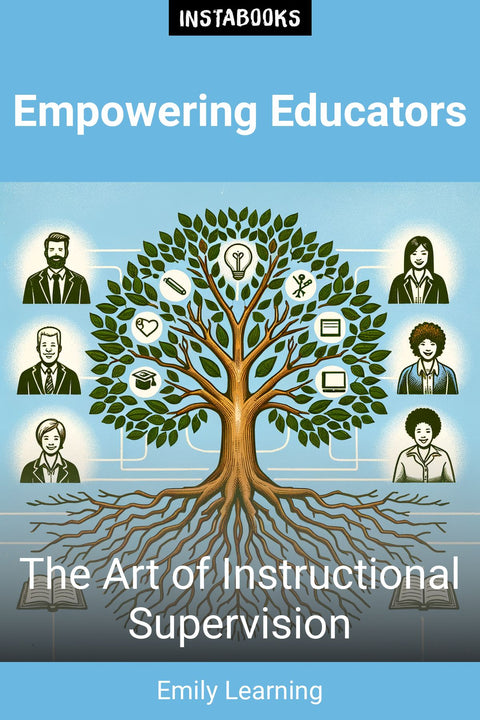
Empowering Educators
The Art of Instructional Supervision
Included:
✓ 200+ Page AI-Generated Book
✓ ePub eBook File — read on Kindle & Apple Books
✓ PDF Print File (Easy Printing)
✓ Word DOCX File (Easy Editing)
✓ Hi-Res Print-Ready Book Cover (No Logo Watermark)
✓ Full Commercial Use Rights — keep 100% of royalties
✓ Publish under your own Author Name
✓ Sell on Amazon KDP, IngramSpark, Lulu, Blurb & Gumroad to millions of readers worldwide
Unveiling the Future of Instructional Supervision
In today's educational landscape, instructional supervision stands as a pivotal force for improving teaching quality and enhancing student outcomes. "Empowering Educators" dives deep into the principles and practices that shape effective supervision, emphasizing the need for quality developmental approaches in fostering professional growth.
Quality Developmental Supervision Explained
Quality developmental supervision is not just a framework; it is a transformative journey for educators. The book provides a comprehensive breakdown of its three crucial phases: diagnostic, tactical, and strategic. Readers will discover how diagnosing teacher needs, addressing immediate instructional challenges, and fostering long-term growth can create a robust foundation for effective learning environments. Case studies and examples illustrate these phases in action, showcasing real-world applications of developmental supervision.
Harnessing Professional Learning Communities
The book delves into the role of educational supervisors in cultivating professional learning communities (PLCs) among teachers. By fostering collaboration, these communities create a supportive environment where educators engage in reflective practice and collective problem-solving. Readers will find detailed analyses of successful PLCs across various educational settings, highlighting their impact on enhancing pedagogical skills and classroom management strategies.
Creating Organic Learning Environments
The organic learning environment is characterized by its nurturing essence, where collaboration and reflection thrive. This book offers insightful strategies to create such environments, including regular meetings and peer observations. Supervisors will learn how to facilitate these processes, ultimately working toward a holistic approach to education that benefits both teachers and students.
Real-World Applications and Case Studies
Through real-world case studies, "Empowering Educators" provides tangible evidence of how quality developmental supervision and PLCs have successfully transformed instructional practices. These narratives offer inspiring insights into how these methodologies foster organic learning environments that significantly improve educational outcomes.
Conclusion
As educational leaders face the challenges of modern teaching, this book stands as a vital resource for those striving to refine their supervisory practices. With a summary of key points and a look toward the future of instructional supervision, "Empowering Educators" equips readers with the knowledge and inspiration needed to elevate educational experiences profoundly.
Table of Contents
1. Introduction to Instructional Supervision- Overview of Instructional Supervision
- Importance of Quality Developmental Supervision
- Goals of Effective Supervision
2. Understanding Quality Developmental Supervision
- Definition and Key Phases
- The Diagnostic Phase Explained
- The Tactical and Strategic Approaches
3. Facilitating Professional Learning Communities
- Role of Supervisors in PLCs
- Benefits of Collaboration and Reflection
- Successful Examples of PLCs
4. Creating Organic Learning Environments
- Characteristics of an Organic Learning Environment
- Strategies for Fostering Collaboration
- Components of Effective Learning Spaces
5. Real-World Applications
- Case Studies in Developmental Supervision
- PLC Impact on Instructional Practices
- Organic Environments in Action
6. Challenges and Solutions in Instructional Supervision
- Common Difficulties Faced by Supervisors
- Strategies for Overcoming Barriers
- Building Resilience in Educators
7. Evaluating Supervisory Practices
- Measuring Effectiveness of Supervision
- Feedback Mechanisms for Growth
- Continuous Improvement Strategies
8. Professional Development for Supervisors
- Essential Skills for Effective Supervision
- Training Opportunities and Resources
- Mentorship within Supervisory Roles
9. Building a Culture of Trust and Collaboration
- Importance of Trust in Supervision
- Strategies for Creating Collaborative Cultures
- Engaging Stakeholders in the Process
10. Looking Ahead: Future Trends in Instructional Supervision
- Emerging Practices in Education
- The Role of Technology in Supervision
- Preparing for Future Challenges
11. Conclusion: The Path Forward
- Recap of Key Insights
- Encouragement for Educators
- Final Thoughts on Instructional Growth
12. Implementing Change in Supervision
- Transformative Approaches to Supervision
- Supporting Staff in the Transition
- Measuring Impact After Implementation
Target Audience
This book is aimed at educational leaders, instructional supervisors, and educators interested in enhancing their supervisory practices to foster better learning environments.
Key Takeaways
- Understanding the phases of quality developmental supervision.
- Strategies to effectively facilitate professional learning communities.
- Creating organic learning environments that nurture collaboration.
- Real-world case studies demonstrating successful supervisory practices.
- Challenging common obstacles and developing resilience among educators.
